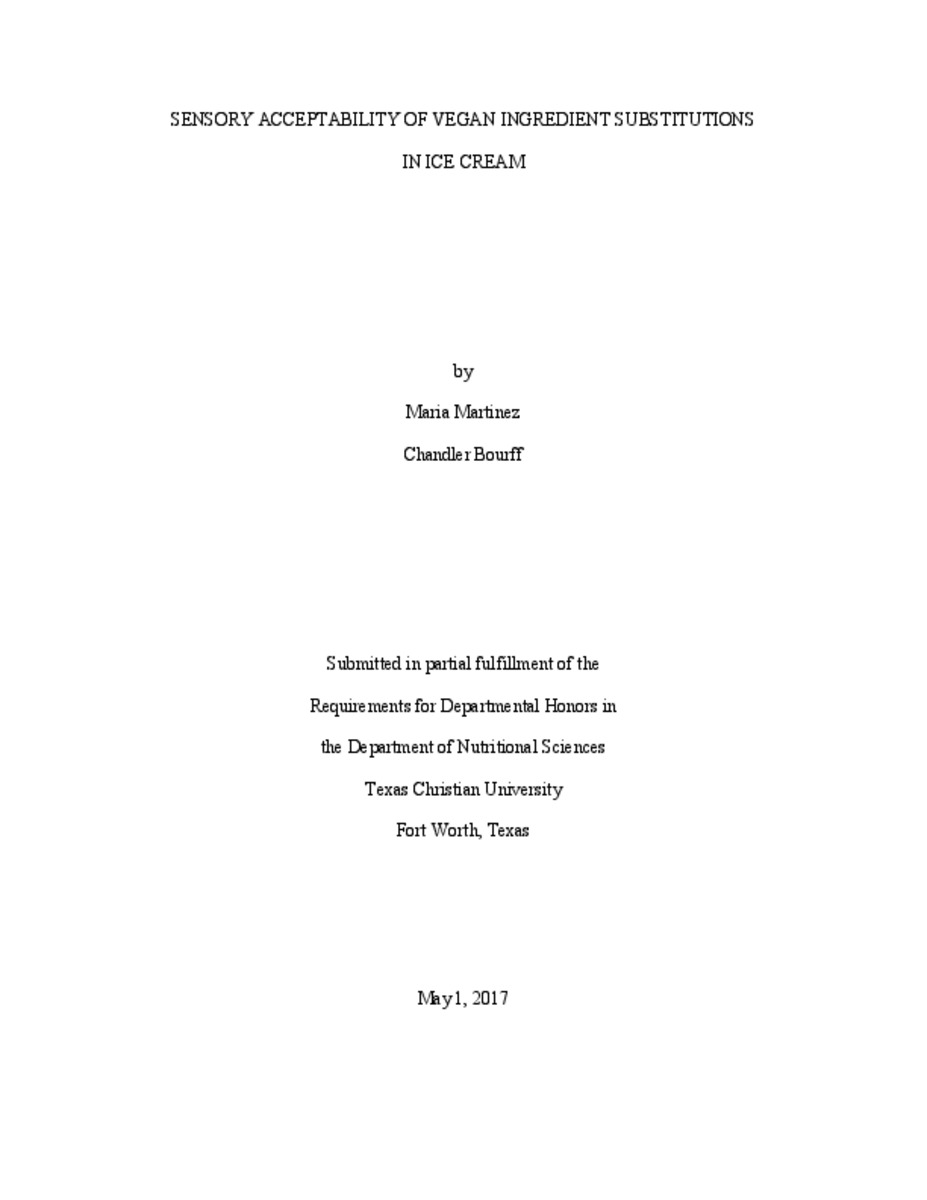Sensory Acceptability of Vegan Ingredient SubstitutionsShow full item record
| Title | Sensory Acceptability of Vegan Ingredient Substitutions |
|---|---|
| Author | Martinez, Maria |
| Date | 2018 |
| Abstract | Introduction: A vegan diet is defined as avoiding the consumption and/or use of meat, fish, poultry or any animal-derived product. Vegans generally have a lower serum cholesterol, body mass index, blood pressure, and risk of heart disease than meat eaters. It is important to use fat substitutions such as dairy and/or egg replacements with vegan recipes. In ice cream, a product mainly composed of: cream, milk solids, sugar, and water, vegetable fat substitutions are often utilized. Fat replacers must contain similar structural components to milk fat to preserve texture and mouthfeel. Objective: Because of the growing popularity of vegan diets, this research project studies the texture, flavor, and eye appeal of vegan ingredient substitutions for ice cream. The purpose of this study is to measure the public's reactions and ratings of these substitutions and to identify which ingredients act as the best replacements. Study Design: The research was collected in a single-blind, cross-sectional study design. 54 students, who were enrolled in one of the two chosen courses under the TCU Nutritional Sciences department, were asked to participate in an experimental sensory evaluation session to complete assessment of 3 different samples of vegan ice cream. Sample A was made using coffee, cashews and coconut cream, B used coconut cream and dates, and sample C used coconut milk. The evaluations took place on two separate occasions in the Annie Richardson Bass Building kitchens. The following were assessed: flavor, sweetness, texture, mouthfeel, eye appeal, color, and overall rating of vegan ingredient substitutions for ice cream recipes. Sensory criteria results from students ranking responses were analyzed using SPSS XIX. Frequency distributions, ANOVAs, correlations, and descriptive statistics were determined to meet study objectives (p<0.05). Results: Based on the analysis of the results from the sensory test, 53% of participants preferred sample A over the other two samples Sample B was the second most preferred with 41.8% of participants reporting that sample B was the preferred flavor. Sample C received the lowest overall acceptability rating, with 73% of the participants disliking the flavor. A majority of participants (51%) stated that sample A was most similar to traditionally prepared non vegan ice cream, and 78% of participants stated that they would consume these ice cream samples outside of the study. Conclusions: Results support the conclusion that there are acceptable vegan ice cream fat substitutes, if made with coconut cream or cashews. Specifically, 53% of participants stated that they preferred sample A, made with cashew, coconut, coffee, likely because of its rich flavor and creamy texture. Additionally, sample B, produced with dates and coconut cream, also was rated positively. This is supported by the significant correlation between overall acceptability, flavor, and texture of samples A and B. Unlike the first two, sample C, made with coconut milk, was disliked by 73% of participants. This sample had too much crystallization, making it an unacceptable product. |
| Link | https://repository.tcu.edu/handle/116099117/22379 |
| Department | Nutritional Sciences |
| Advisor | VanBeber, Anne |
| Additional Date(s) | 2018-05-19 |
Files in this item
This item appears in the following Collection(s)
- Undergraduate Honors Papers [1463]
© TCU Library 2015 | Contact Special Collections |
HTML Sitemap



